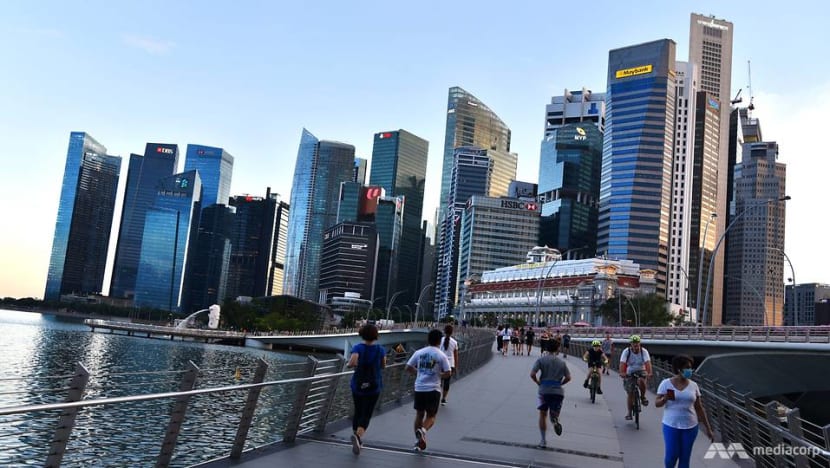Gen Zers trail baby boomers in sustainability awareness, climate action: Study
The second OCBC Climate Index found that Singaporeans who embrace sustainable behaviours are motivated primarily by personal practical benefits, such as health, cost and convenience, and not for the environment.

The Singapore city skyline as seen from Jubilee Bridge. (Photo: Jeremy Long)
SINGAPORE: A survey that measures the current levels of environmental sustainability awareness and climate action among Singaporeans has found that baby boomers are leading the pack in embracing climate actions.
The demographic, which includes respondents aged between 58 and 65, has achieved the highest scores across the three key pillars of the OCBC Climate Index - awareness, adoption and advocacy.
A follow-up study to better understand baby boomers' motivations and behaviours found that they now have more confidence in using digital tools to spread sustainability awareness and share environmental news, OCBC said on Tuesday (Aug 16).
OCBC added that green habits suit baby boomers' life stage - "they are less busy and can take the time to walk, cycle or take public transport, instead of opting to drive".
"Such actions lead to better health and help them save costs as well, another motivating factor in their adoption of greener behaviours."
It added that baby boomers have experienced firsthand the weather shifts associated with climate change.
Baby boomers scored highest in the home, food and goods themes of the survey. Conversely, the youngest generation surveyed scored the lowest in those categories.
"While they (Gen Zs) had an overall adoption score of 6.5, their score was only pulled up as they would have travelled overseas by plane less, and take public transport the most as they are not likely to own cars and are less likely to drive," said OCBC.
Baby boomers' advocacy score - which measures how often one encourages others to adopt green practices - saw a sharp rise from 4.7 last year to 6.1. OCBC noted that baby boomers went from scoring the lowest among generations in the previous edition of the survey to the highest this year.
Their main motivations to live sustainably are for better health, a cleaner and greener environment and to save money, in order of choice.
HEALTH, COST AND CONVENIENCE KEY DRIVERS OF CHANGE
The second OCBC Climate Index found that the majority of Singaporeans are still not embracing many sustainable behaviours.
Respondents who embrace sustainable behaviours are typically motivated by personal practical benefits, such as health, cost and convenience, and not for the environment, OCBC said.
Despite 47 per cent of respondents indicating that they desire to live a sustainable life for a greener future, more are engaging in carbon-intensive behaviour such as using air-conditioning as the main mode of cooling their homes and buying new, non-essential items more frequently than once a month, as compared to 2021.
Those who do not engage in carbon-intensive behaviours are "not necessarily embracing climate action for environmental reasons", OCBC said.
"Rather, the reasons for their choices are personal and include wanting to have better health, save money and personal comfort."
These motivations are leading people to walk, cycle or take public transport instead of travelling by car, purchase second-hand furniture and participate in 'urban farming' initiatives, OCBC noted.
The national average score for 2022 of 6.7 was unchanged from 2021.
This year, having better health and having a cleaner and greener environment were both reasons for respondents for wanting to live a sustainable life, at 47 per cent.
Cost and inconvenience were cited as the main obstacles to living a sustainable life.
"Thus, the desires to want a more sustainable world have not tilted the Index score this year as personal practical reasons continue to drive real actions," said OCBC.
Although the overall score remained the same as last year, Ms Koh Ching Ching, Head of Group Brand and Communications at OCBC Bank noted that this year’s survey results showed more Singaporeans want to create a more sustainable world but find it difficult to make the real change when it is expensive or not convenient.
Ms Jessica Cheam, founder and managing director of Eco-Business also noted that while the findings might be discouraging at first glance, there are "bright spots" in the results that indicate improvements, such as in transport choice or in embracing re-commerce.
In its inaugural edition, the OCBC Climate Index in 2020 found that high awareness of environmental issues did not reflect on adoption of green practices.
HOW THE OCBC CLIMATE INDEX IS CALCULATED
OCBC said that its Climate Index, developed in partnership with Eco-Business, measures the current levels of environmental sustainability awareness and climate action among Singaporeans.
The national average score for 2022 was 6.7, with Singaporeans scoring an average of 8.1 in the Awareness section, 6.5 in Adoption and 5.6 in Advocacy.
About 52 per cent of respondents had scored between 6 and 7.9, indicating that the average Singaporean is highly aware of environmental issues, adopts many green practices some of the time and advocates some of these issues and practices to their families and friends, OCBC said.
"The Index is derived from a survey sent to a nationally representative demographic sample of Singaporeans. From Jun 4 to Jun 16, 2,169 Singaporeans aged between 18 and 65 were surveyed online on 106 questions relating to the three key pillars across the four themes."
The three key pillars are defined as such: Awareness for knowledge of environmental issues, adoption for how much and how often one adopts green practices, and advocacy for how often one encourages others to adopt green practices.
"To derive the national average score, the Index takes into consideration four lifestyle themes that represent the main aspects of urban living: transport, home, food and goods," OCBC said.
These were weighted based on how they impact an individual’s carbon footprint – Transport (45 per cent), Home (25 per cent), Food (15 per cent) and Goods (15 per cent).

















